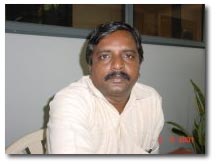|
 When
a class of social scientists is trying to come up with complex
explanations for why rural India is burning, an exceptional village
panchayat leader Elango's simple explanation is this: "All
because we have forgotten Gandhiji." Elango's story is
unique because he goes beyond words to demonstrating what Gandhiji
would have liked done if he were to be alive today. When
a class of social scientists is trying to come up with complex
explanations for why rural India is burning, an exceptional village
panchayat leader Elango's simple explanation is this: "All
because we have forgotten Gandhiji." Elango's story is
unique because he goes beyond words to demonstrating what Gandhiji
would have liked done if he were to be alive today.
Rangaswamy
Elango hails from a dalit farmer family from Kuthambakkam
village (40 km from Chennai in Thiruvallur district), Tamil
Nadu. Born and brought up in the village, Elango grew up to become
a chemical engineer and was a scientist at the Council
for Scientific Industrial Research (CSIR) for eight years.
Every time Elango visited his village, which was fraught with
poverty, natural resource degradation, caste riots, illicit distilling
(which employed 35% of the population) and associated evils, his
desire to do something burnt brighter. Finally, in 1994, Elango
left his job in 1994 and began working with his fellow villagers
to improve their living conditions. He independently contested
and won the 1996 panchayat election and has been reelected in
the 2001 elections with zero campaign cost.
Over
his first term of five years, Elango visited and studied several
experiments in rural development across India and made inroads
into the government's planning committees on Panchayati Raj.
He has eradicated alcoholism, employing all the rehabilitated
families in constructing low-cost, eco-friendly houses and health
centres, laying roads and drains, installing street lights and
creating water harvesting structures. Most importantly, Elango
has inspired the traditionally antagonistic dalit and non-dalit
communities to live together peacefully in twin houses. "Sounds
too good to be true!" Most of those who have heard the story
of Kuthambakkam have had to visit the village and meet Elango
to believe it! The minister for rural development was one of them.
After
being elected in the second round of panchayat elections in October
2001 at no cost, Elango is now undertaking the next and the most
challenging task of establishing a land/agriculture-based village
economy. Elango says "Every village has its own economy.
Today, the money outflow is greater than the inflow, because villagers
buy most of their household commodities from outside. This is
why they remain poor in spite of the hundreds of government schemes
and all the good effort by NGOs. All we need to do is to help
them produce as much of the basic necessities (like food and clothing)
as possible within the village." Before you even begin
to wonder if this is really possible, he is already well into
implementing his plan. A toor dal processing unit, a dairy
industry, a groundnut processing industry, a jute industry, a
leather industry, a handloom industry, a bakery and a soap-making
industry are all a reality today. More are on the anvil!
The rural industries will, to the extent
possible, be land- (agro-) based; use locally available
raw-materials and indigenous knowledge; cater to the local market;
meet the basic needs of villagers - food, clothing and shelter -
to attain self-sufficiency; be diverse; work on a cooperative
model through men and women SHGs. be heavily dependent on human
power; be environment-friendly.
Plans
to revive village economies are always met with skepticism with
one of the most immediate responses being "How can our products
compete with those of big corporations?" Elango challenges
the foundation of modern economics which says "A healthy
economy is all about competition, and being more strategic and
faster than the rest", and to relearn that it is more
about cooperation and pride. Today, the villagers are willing
to buy what is produced by their own village industries. Elango
once obtained a sample of a soy-based sambar powder from CFTRI
(Central Food Technology and Research Institute), which was highly
nutritional and easy to prepare and use. He went to every street
and demonstrated the preparation of sambar with the mix involving
the villagers and served almost the entire village folk what was
accepted as a tastier sambar. The villagers are now willing to
buy the soy-based sambar powder, if produced in their own village
with the most unappealing packaging!
If
you thought this was anyway a small experiment being carried out
in one of many thousands of villages in Tamil Nadu, think again!
Elango has traveled extensively across Tamil Nadu and identified
around 400 committed panchayat leaders. Over the past few years,
he has built this network and has constantly been
consulting them on their powers and duties as panchayat leaders,
and more importantly, in Elango's words "reminding them
of Gandhi." The establishment of a 'Panchayat Academy'
in Kuthambakkam is also underway, where these leaders would gain
exposure to village reconstruction and a working model of a village
economy.
Elango
has recently been awarded 'Ashoka Fellowship', and was
invited by the UK government to study and share his experiences
on local-self governance.
Elango
has now been invited by the American government to study
local governance in the USA between August 11 and September 29,
2002. He will be visiting the following cities to meet with Indians
interested in learning more about his work: Washington DC, Dallas
TX, Chicago IL, Seattle WA, Portland OR, Minneapolis MN, Ames
IO, Flint MI, Boston MA, New Haven CT, Princeton NJ, Columbus
OH, Milwaukee WI, Newark DE and San Francisco CA.
|





